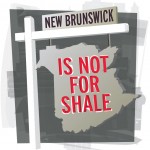The following letter was sent to New Brunswick Premier Brian Gallant and members of the Liberal Caucus on 22 February 2016.
Dear Premier Gallant:
The Commission on Hydrofracking will soon submit its report and the government will make its decision on the future of shale gas in the province. We have to ask: “After 5 years of examining the pros and cons, what evidence has accumulated to support each side?”
To answer this question we have put together a short summary of the latest news and scientific information on a few of the major issues at the heart of the discussion. We hope you will take the ten minutes necessary to read the attached document.
The executive summary follows.
Quick Link:
Full Legislative Briefing document (pdf).
The Case Against Shale Gas: Executive Summary
The Economic Case for shale gas, if it ever did exist, has evaporated. The shale gas investment “bubble is now bursting. Dozens of companies face bankruptcy and massive layoffs.
SWN, the largest gas leaseholder in New Brunswick:
- Was not operating a single drilling rig at the start of 2016
- Just laid off nearly half of its employees,
- Shares in its stock, once in the upper $40/share range, now sell in single digits,
- Moody’s has lowered its bonds to ‘junk’ status.
Potash Corporation – one of NB’s largest users of gas – has left the province. Shares of Corridor Resources, which provided gas for Potash, are valued at thirty-nine cents.
The rapid growth of inexpensive, renewable energy casts doubt on the LNG export business. Projects have been cancelled or postponed. Analysts say that these trends show, “There could not be a worse time to be embarking on challenging gas projects.” In shale areas, a ‘boom’ that lasted less than a decade has led now to a ‘bust’: cuts to budgets and services, increased deficits, severe social problems including unemployment, and abandoned wells.
The Climate Change Case against shale gas has strengthened.
- 2015 was the hottest global year on record by a large margin
- Goals of the Paris climate change conference require that two-thirds of all proven fossil fuel reserves must stay in the ground
- Federal government and Liberal party take the issue seriously
- Fugitive emissions of methane make gas unsuitable as a ‘bridge’ fuel
- Leaking methane from damaged cement seals on wells remains the Achilles’ heel of the gas and oil industry

Dr. John Cherry speaks in Fredericton
The Water Contamination Case against shale gas continues. In 2014, the Canadian Council of Academies reported a total lack of scientific monitoring of groundwater at shale sites, and a lack of a scientific basis for regulations. Contamination specialist Dr. John Cherry says that that lack remains, adding that New Brunswick “shouldn’t experiment with shale gas until that situation changes”.
The US EPA’s draft report on shale found cases of water contamination in every category it covered, saying many more are likely hidden behind court settlement ‘gag orders’.
The EPA’s Science Advisory Board’s draft review of the report found that this evidence did not support the conclusion that no ‘widespread systemic contamination’ was found. It called for the removal of that phrase from the report, and criticized the report’s omission of EPA investigations that had found contamination, and its failure to discuss the serious consequences of contamination.
The Public Health Case against shale gas is growing. The EPA noted that the health effects of 92% of chemicals used in fracking remain unstudied and untested, even as public health studies associate a growing number of serious illnesses with the industry.
Earthquake concerns continue to grow. Earthquakes associated with shale development have increased exponentially in number and strength, occurred in more places, and are linked to both fracking and wastewater injection wells. Wastewater disposal thus also remains an unsolved problem.
Conclusions
 The only logical and moral response is a ban or minimum 10-year moratorium on shale gas and hydrofracturing. Citizens in the areas affected by shale gas development, including their local governments and First Nations, will accept no less.
The only logical and moral response is a ban or minimum 10-year moratorium on shale gas and hydrofracturing. Citizens in the areas affected by shale gas development, including their local governments and First Nations, will accept no less.
NBASGA would be much happier working with the government to promote and secure a sustainable future in our province, rather than pursuing justice in a court of law.
